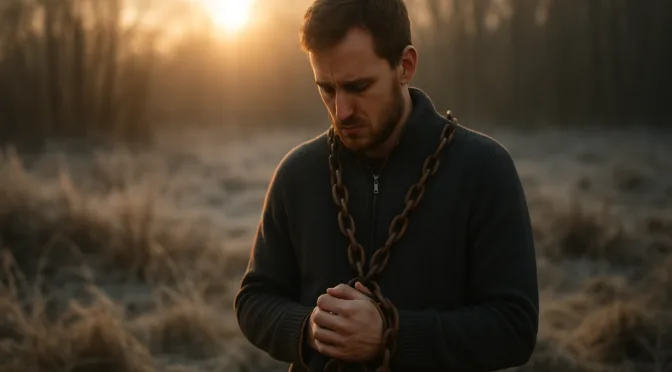Letting Go of Bitterness
Article 8 in the 12-part series on Overcoming Sin
Bitterness is a silent captor. It hides deep, waiting for offense to fester and justice to delay. It promises to protect you from further hurt—but instead it chains your soul to pain. Bitterness is not just a feeling—it is a sin that hardens the heart and robs you of intimacy with God. Freedom in forgiveness is the only way out.
“Let all bitterness and wrath and anger and clamor and slander be removed from you, along with all malice. Be kind to one another, compassionate, forgiving each other, just as God in Christ also has forgiven you” (Ephesians 4:31–32, NASB). That’s not a gentle suggestion—it’s a divine command. And not just for the offender’s sake—for yours.
The Poison We Choose
When someone wounds us deeply, our flesh cries out for justice. We replay the words. We relive the betrayal. We rearm our hearts with silent vows: “I’ll never trust again.” But every time you drink from the cup of bitterness, hoping it will punish them—it poisons you instead.
Bitterness twists your prayers. It colors your conversations. It silences your worship. But most tragically, it distances you from God, who is mercy. For how can you draw near to the One who forgives all, while refusing to forgive even one?
A Lesson from the Tree
Picture this: a barren tree stands in winter, branches stiff with ice, roots tangled and hard. Beside it, a sapling stretches upward—new, alive, free. Both have faced the cold, but only one has let go of the season behind it. The other clings to a bitterness buried so deep, not even spring can touch it.
Bitterness is like that frozen root—it resists warmth, even when light breaks through. But forgiveness is the melting sun. It does not ignore the wound. It does not pretend the cold never came. It simply refuses to live there anymore.
Forgiveness is Not Forgetting
Understand this, beloved: forgiveness does not erase the pain. It does not deny the offense or excuse evil. Yeshua never excused sin—He bore it. And on the cross, bloodied and betrayed, He prayed, “Father, forgive them” (Luke 23:34, NASB). He didn’t wait for an apology. He didn’t demand an explanation. He released them, so that we might know how to be free.
Forgiveness is not forgetting. It is entrusting. Entrusting your pain to a God who sees all, knows all, and judges justly. It’s laying down your right to repay and choosing instead to reflect the heart of El Shaddai—merciful, slow to anger, abounding in steadfast love.
How to Let Go of Bitterness
- Bring the offense into the light. Don’t suppress it. Name the hurt. Confess the bitterness.
- Remember how much you’ve been forgiven. Your forgiveness is not earned; it was bought.
- Speak forgiveness aloud. Say their name. Say the words. Even if your feelings don’t yet follow.
- Pray for the one who hurt you. Nothing softens the heart faster than intercession.
- Leave it in God’s hands. Justice belongs to Him. Trust Him to deal rightly.
Freedom begins when you release them—but it continues when you entrust your future to God’s hands, not your own wounds.
Your Heart Was Meant to Be Free
Bitterness is a prison disguised as armor. But Yeshua has the key. “So if the Son sets you free, you really will be free” (John 8:36, NASB). The enemy would love for you to cling to your offense and wither under the weight of what they did. But you were not called to live bitter—you were called to live free.
Release the grudge. Release the debt. Tear up the list. There is no freedom in rehearsing the pain—but there is glory in becoming like Christ.
Forgive. Not because they deserve it. But because He forgave you.
⸻
The Unpaid Debt That Chained Me
Imagine a man walking through life with a heavy chain wrapped around his shoulders. Each link is engraved with a name, a wound, a memory: “She betrayed me.” “He never apologized.” “They should’ve protected me.” He drags it everywhere—into his prayer closet, into conversations, into sleepless nights. The chain clinks with every step. At first, it felt like justice. Over time, it just felt like weight.
Then one night, in a dream, he sees Yeshua. The Savior holds out His hands—scarred, pierced—and says, “That chain doesn’t belong to you. I already paid for that.” But the man hesitates. “They owe me,” he whispers. Yeshua’s eyes don’t flinch. “Yes,” He says gently, “but so did you. And I forgave you everything.”
Tears fall. The man unlatches the chain and lays it at the foot of the cross. For the first time in years, he stands straight. Lighter. Free.
This is the power of forgiveness—not that the debt disappears, but that it’s placed into the hands of the only One worthy to carry it.
You can carry the weight, or you can walk in freedom. But you cannot do both.
⸻
Prayer
Father, I bring You every wound, every offense, every silent grudge I’ve held too long. I confess the bitterness that has grown in me. I lay it at Your feet. By Your grace, I choose to forgive—not by my strength, but by the power of Yeshua’s blood. Help me release them fully and trust You with the justice I cannot bring. Cleanse my heart, melt what’s frozen, and teach me to walk in mercy. Let me live free. In the name of Yeshua, amen.
⸻

